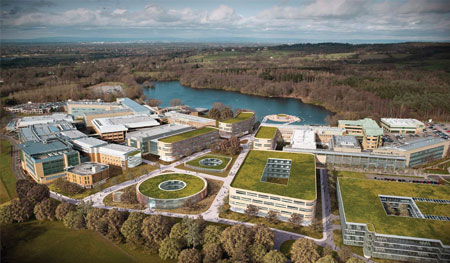UK R&D Centre for Antimicrobial Resistance Goes Into Battle
Executive Summary
The UK's recently launched AMR Centre has launched two R&D collaborations and plans two more this year.
The UK’s R&D Centre for Antimicrobial Resistance announced its first two collaborations in September and will soon be inking two more. Established in May 2016 as part of the UK’s response to the global threat from antimicrobial resistance, the AMR Centre is based at Alderley Park near Manchester, northern England, a joint private-public initiative to support and accelerate development of new antibiotics and diagnostics using an integrated development capability and offering translational R&D from preclinical hits through to clinical proof of concept.
The idea behind the AMRC was conceived during the tenure of former British Prime Minister David Cameron, a big supporter of finding ways to effectively combat antibiotic resistance. It was under his direction that former Goldman Sachs economist Jim O'Neill conducted in depth analyses of the AMR crisis and brought the issue to the collective attention of world leaders.
The AMRC's mission was to get new, novel and needed antimicrobial drugs and diagnostics to market in the shortest possible time, irrespective of cost and origin. But Britain's referendum decision in June 2016 to leave the EU - and subsequent changes in the UK government - forced the AMRC to rethink how it operates, Ian Grundy, chief business officer at AMRC told Scrip.
"We were initially encouraged to set up this organization by Cameron and [then chancellor of the exchequer George] Osborne and [former treasury minister Jim] O'Neill, but then the Brexit vote happened and the whole landscape changed – funding from central government initially earmarked to support the operation fell away, and that meant that we had to refocus and redesign the organization and effectively look for the supporting funds in different locations, primarily in Northern England, and that's what we did," Grundy said in an interview. (Also see "Jim O’Neill Is “Free For Global AMR Role” After Leaving UK Government" - Pink Sheet, 23 Sep, 2016.)
AMRC today is a limited corporate entity with a partnering model aimed at progressing research through to clinical trials quickly, so that treatments can be brought to market and the threat of antimicrobial resistance can be significantly reduced.
AMR Centre at Alderley Park Near Manchester AMRC
Antibiotic discovery is challenging because bacteria are able to genetically modify and become resistant to medicines. Big pharmaceutical companies have meanwhile heavily cut their investment in antibiotic research because it has not been sufficiently profitable.
Stepping into the breach, the AMR Centre today has around 20 chemists and microbiology scientists in its laboratories at Alderley Park working on new antibiotics.
"The sad thing is that that makes us the largest anti-infectives operation in the UK, and that's a depressing indictment of the situation, given the seriousness of the global AMR crisis," Grundy noted.
The center aims to progress between four and five new projects each year, Grundy told Scrip. "We directly provide services to the companies, either medical resources, or microbiology or getting work done by third parties, so we work closely with a number of universities and companies and we might fund work there."
CARB-X Consortium
The AMRC is part of the trans-Atlantic CARB-X (Combating Antibiotic-Resistant Bacteria Accelerator) consortium, the world's largest public-private partnership, between the UK charity Wellcome Trust and the US Department of Health and Human Services Biomedical Advanced Research and Development Authority (BARDA), as part of the Office of the Assistant Secretary for Preparedness and Response, and the National Institute of Allergy and Infectious Diseases (NIAID), part of the National Institutes of Health (NIH). (Also see "Wellcome Trust Makes AMR Strategic Priority After Funding O'Neill Review" - Pink Sheet, 5 Jan, 2017.)
Brexit Brought Reboot
"The idea was that we'd sit alongside CARB-X but we don't work exclusively with CARB-X, which funds some percentage of a project but which works less with companies located outside the US because they're not allowed to claim overheads," Grundy explained. So, for small companies especially, that still left them needing to find match-funding, so the AMR Centre in effect provides that. The center is linked to the UK’s Northern Health Science Alliance, bringing together clinical academic capabilities of eight cities.
"In return, we take a stake in the project, so if it's successful we get money back and we can then pay some money back to our stakeholders and thus we can be self-sustaining and be a long-term effort, not just a short-term sprint, so to speak.
"Although we were one of the founders of CARB-X, we work alongside CARB-X and are not involved in deciding which companies get money from CARB-X." (Also see "AMR Roundtable: Optimism About CARB-X's Success And Prospects For The Future (Part 2)" - Pink Sheet, 18 Jul, 2017.)
Partnering Model
Grundy said the AMR Centre offers a clear partnering structure and options.
The model means the AMRC takes on projects at risk – it does not charge for the work done. Meanwhile, ownership of the asset remains with the originator, along with associated IP, unless sold to AMRC at the outset.
Programs are stage-gated with either party having the option to stop at any time, while on successful commercialization, AMRC will receive a pre-agreed percentage of any revenue. That arrangement helps the organization to continue its work.
The AMR Centre does not normally invest in companies and as such offer a non-diluting funding option, Grundy said.
Existing Projects
AMRC has so far joined in two projects, both announced in September: one with US-based Microbiotix Inc. and another with Sweden-based Medivir AB.
The collaboration with Microbiotix will see the parties combine resources and leverage their antimicrobial R&D expertise to accelerate the development of Microbiotix’s type III secretion system inhibitor project, which was awarded up to $3.2m, based on successful progression through milestones, from CARB-X (Combating Antibiotic-Resistant Bacteria Accelerator) in March 2017. Under that agreement, the AMR Centre will provide up to $1.1m of technical support including over $600,000 of project funding, alongside $1.6m of initial CARB-X funding, to identify a drug candidate to take into clinical trials.
“Microbiotix’s T3SS inhibitors are an early stage program. The novel mode of action addresses the effects of the infection without directly killing the organism. That way the solution does not encourage the bug to evolve resistance," Grundy explained. "This project with Microbiotix is very much a co-development and as such our UK based scientists are also working on what candidates to take forward," he added.
The second collaboration to date gives AMRC exclusive worldwide rights to Medivir’s research stage metallo-β-lactamase inhibitor program, which tries to extend the life of existing antibiotics.
"Medivir couldn't get CARB-X funding so they were resigned to not do much with the project as they are refocusing their R&D, so we decided to take that on and move it forward," Grundy told Scrip. "In most cases we will deal with the IP stays with the originators, but the Medivir arrangement is different because the total project has transferred to us now because they have basically exited this whole area," Grundy said.
New AMR Deals Coming
"Our prime focus is either on antibiotics or diagnostics. At the moment we are not doing any projects on diagnostics. We tend to look at different approaches to antibiotics to try and encourage innovation," he said.
"We have two more projects in the planning and which will be announced in the next four to five weeks, again where we're supporting projects that have got funds through other sources as well," Grundy added
One of those projects is a peptide "that basically breaks the cell open and allow the drugs to get inside and kill the bug."
"What we're not interested in just tweaking an existing class of drug, because it might work for a few years but it will soon get resistance built up to it. There's not been a new class of antibiotic in 30 years. We want to be helping solve that problem."
"The total funding per project that we're involved in is typically $2m and the funding of that is partly from us, partly from the originators and maybe partly from CARB-X."
"But we want to take on more people and get more funding and that should let us take on more projects going forward," Grundy concluded.
AMRC partners currently include: the Northern Health Science Alliance; Manchester University; Corporate finance boutique Acceleris Capital; brand and marketing innovation provider for the Northern Powerhouse BEBRAND; and venture capital investors Catapult.
